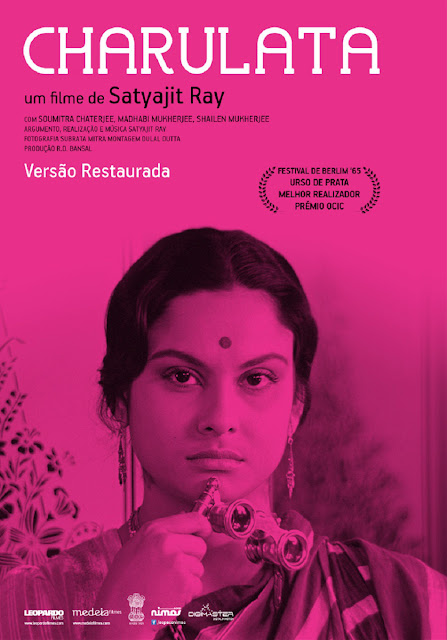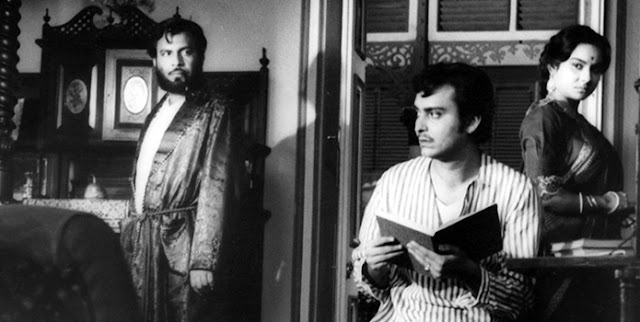CHARULATHA
A film by Satyajit Ray
1964/ Bengali/ 120 minutes
2nd April 2017/ 5.45 pm/ Perks Mini Theater
http://konangalfilmsociety.blogspot.in/
A film by Satyajit Ray
1964/ Bengali/ 120 minutes
2nd April 2017/ 5.45 pm/ Perks Mini Theater
http://konangalfilmsociety.blogspot.in/
Charulata, Ray's favorite film, is based on the popular novella Nastaneer (The Broken Nest) by the great Bengali writer Rabindranath Tagore, who was the first Asian writer and poet to be awarded the Nobel Prize for Literature in 1913.
The film is set in 1870s Calcutta and the overwhelming majority of it takes place inside the lavish home of an ambitious and very patriotic newspaper editor who rarely has time to talk to his beautiful wife. He loves her, but he loves his country even more. Knowing well that the future of India will likely be determined by the winners in the upcoming elections in England, he writes articles that frequently highlight the views promoted by the Liberal Party. During an unusually hot summer day,
Bhupati (Shailen Mukherjee) finally realizes that he is spending too much time with his "second wife", which is how he jokingly refers to his newspaper, and invites his cousin Amal (Soumitra Chatterjee, The World of Apu), an aspiring writer, to spend some time with his real wife, Charulata (Madhabi Mukherjee.
This excellent film directed by the great Satyajit Ray tells two different stories. The first is that of a young woman who is trying to listen to her heart in the wrong place at the wrong time. In the beautiful cage she has been placed in, however, writing is the only thing that occasionally makes her feel alive. The second and less obvious story is about a country looking for a new direction. As the film progresses, it becomes clear that there is tension in the air that could inspire dramatic events.
Ray never delivers any political statements in the film, but it is easy to tell that like Charulata the country is quietly frustrated with the role that has been chosen for it. The beauty of the film comes from its calmness and simplicity. Ray follows the conversations between the three protagonists without ever forcing the viewer to side with any of them. They exist and Ray and his camera are there to simply capture the moments they share. However, all of this, the observation and the acting, is done with a tremendous sense of effortless grace and elegance that makes viewing Charulata a very special experience. (Source:Internet)
Satyajit Ray
Satyajit Ray was born on May 2, 1921 in Calcutta into a Bengali family of a distinguished cultural lineage. After graduating from the famous Presidency College of Calcutta, Ray enrolled in the Visva-Bharati University founded by noted poet Rabindranath Tagore. During his stint in the Visva-Bharati, Ray's creative faculties were enriched by the exposure to different nuances of fine arts. Consequent to the course completion, Satyajit Ray joined advertising agency D.J. Keymer as a visualiser. After a couple of award-winning assignments, he joined publishing house Signet Press with the responsibility of designing cover jackets for books. While the job itself was an exercise in creativity, more importantly it led to Ray's first brush with the cream of Bengali literature. He gradually developed a passion for films and with a few friends founded the Calcutta Film Society in 1947.
In 1949 Satyajit Ray married his distant cousin Bijoya Das. The same year French director Jean Renoir came to Calcutta and the great filmmaker's encouraging words motivated Ray to tread the path of filmmaking. Next year Ray went to London as D.J. Keymer's art director and there he got an opportunity to watch Vittorio de Sica's film 'Bicycle Thief.' The film, a neorealist classic, kindled the filmmaker in Satyajit Ray. He returned home determined to film Pather Panchali. Despite being dogged by financial hassles, Ray and his ensemble of amateur crews finally completed the film and released it in 1955. The film won rave reviews all over the globe and heralded the arrival of a master filmmaker. Satyajit Ray made two more films Aparajito (1956) and Apur Sansar (1959) based on the life cycle of central protagonist Apu. Riding on the crest massive success and adoration, Ray unleashed a slew of memorable films such as Jalsagar (1958), Devi (1960), Teen Kanya (1961), Abhijan (1962), Kanchenjunga (1962), Mahanagar (1963)) and Charulata (1964). Some of his prominent films during later period are Goopy Gyne Bagha Byne (1969), Pratiwandi (1970), Jana Aranya (1975), crime fiction Sonar Kella (1974), Jai Baba Felunath (1978) and Shatranj ke Khiladi (1977), his first film in Hindi. In 1983 a severe heart attack crippled Ray's mobility and his last three films, Ganashatru, Shakha Proshakha and Agantuk couldn't create the magic of his earlier films. Satyajit Ray breathed his last on April 23, 1992.














